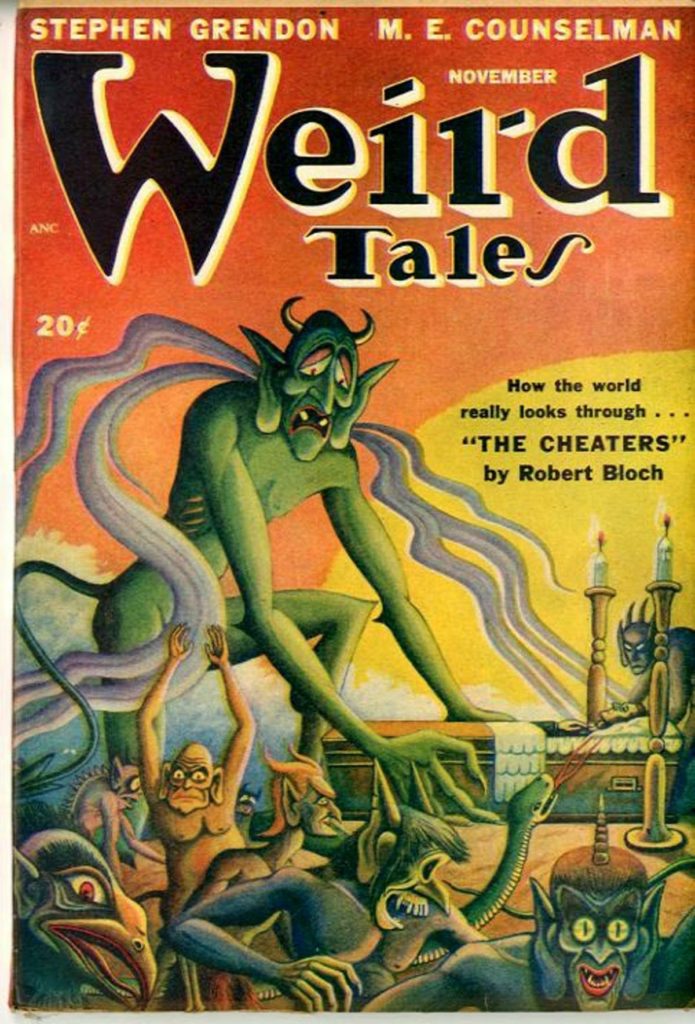Please Quit Calling It ‘Weird’
 All this next could be questioned if even one commentator, or even better, a Christian speculative publisher, can prove the word “weird” is market-tested. If hordes of readers are thrilled at the thought of getting their hands on “weird” Christian fiction, my dislike of this term may prove only personal.
All this next could be questioned if even one commentator, or even better, a Christian speculative publisher, can prove the word “weird” is market-tested. If hordes of readers are thrilled at the thought of getting their hands on “weird” Christian fiction, my dislike of this term may prove only personal.
Yet I do dislike it — the word weird, when applied to Christian speculative fiction.
By no means am I picking on publishers or authors who use the term! Yet I also wonder if, by stressing this word, we’re needlessly limiting the genre and its potential growth.
Here we have two potential motivations for reading a Christian speculative story:
- I like Christian spec-fiction because it’s Weird. In the morning I get up and want stories You Probably Haven’t Heard Of. Part of me also wants to “stick it” to stories that “normal” people enjoy. You can have your modern dramatic fiction without magical worlds, and straight-up histories instead of alternate-history steampunk craziness! Give me weird any day! The weirder, the better!
- I like Christian speculative stories because they, unlike other genres, most closely match the wonders of the true-life Story, the Bible, and show us the nature of the Author, His truths, fantastic wonders, and love. In the morning I get up and wonder (or should wonder!): “How can I learn about and love this Author more today?” I’ve tried other genres. While they have their place, it is speculative stories that draw me closer to Him. Magic, alternate histories, science fiction, horror, paranormal, even “weirdness” — they’re all only means to the greatest End.
Sure, I’ve simplified things a bit. I may have also strongly implied that I wholly agree with number 2 and detest number 1. That’s not true. Maybe we all have a little “hipster” in us. Maybe we all would like to beat the other reader to a popular story, or out-Weird another person in our reading preferences, or have our own private revolutions against admittedly tame and artificially “safe” Christian fiction. I know I often act like this.
But I also don’t want to stay there. Battles for “unsafe” stories, that push limits and may show the world as it really is, are means to a greater chief End. So is freedom to explore worlds where people and rules aren’t exactly the same as they are here. So is weirdness.
So why market Christian speculative books based solely on the fact that they’re Weird?
Here are three reasons why we should at least make that argument secondary to others:
 1. Speculative stories aren’t really “weird” anyway.
1. Speculative stories aren’t really “weird” anyway.
When we’re trying to “sell” reluctant Christian friends on the merits of a speculative novel, taking a reactionary position (Christian fiction today is just too safe!) or else an “indie,” hipster appeal (you’ve probably never heard of it) just doesn’t cut it.
This is not a theological objection. Those come in a moment. It’s a marketing one.
A better case could be made like this. I’ve seen this work at least to provoke curiosity in people who would otherwise not touch a “weird” novel, or be swayed by that term.
Speculative stories may sound strange and subversive. You may like that presentation of them. Others may not. But for either set: consider the highest-grossing films of all time. (Becky’s 2006 top-ten list is here; an updated list is here.) Of the top 20 films, only two — Titanic and The Passion of the Christ — could be considered non-speculative. But they’re still fantasy-esque (especially Titanic), and epic in scope.
In Christian circles, the most popular fiction authors perennially prove to be C.S. Lewis and J.R.R. Tolkien. Are they Weird? At first, perhaps. But now they are mainstream.
Are all these stories Weird? Not at all. Instead they prove that speculative stories are the dominant, perhaps default, genre of fiction. I don’t call that weird. Rather, I’d have to conclude that those who feel this genre is weird are themselves strange characters.
2. The Bible itself is epic, miraculous, fantastic, even “speculative.”

Those who avoid speculative stories because they are Weird, and those who agree but push those stories because they consider Weirdness a plus, might want to ponder this.
The Bible is the most incredible Book ever, full of incredible stories and themes: battles, miracles, the nastiness of sin, rising nations, fantastic creatures, and the central Story of God’s creation of man, man’s fall, and God’s plan to save His creation. Over all of that is the Story’s infinite Author and Hero. He’s infinite, incredible, creative, loving, and holy.
So I would ask why many Christian stories don’t better reflect these themes. At present, most Christian novels are from non-speculative genres that include God as a supporting character. That’s not evil, of course. But they do tend to be detached from the greatest Story of the Bible — the Gospel. They may be fun to read, but how do they help us in our fantastic reality, in which this incredible God is always working, even in small ways, to save sinners and redeem His creation? How do they remind us of the true Story?
If we avoid stories that echo the great Story, that’s what’s truly Weird. Even “escapist.”
3. The “weird” term may limit readerships only to Christians with fringe interests.
Do we want this genre to grow, to be “mainstream” as it should have been all along?
Or do we want to keep focusing on a narrow readership: Christians, who have already been persuaded that speculative stories are “weird” and that they should like them that way, that Weird by itself is good, and that stories need no benefit beyond being Weird?
These may be more oversimplifications. I also don’t mean to imply that speculative fans should, say, disregard all the delightful, quirky, even “indie” types of readers, in favor of acquiring only garden-variety wholesome middle-class Christian moms with suburban homes, flower-print-covered Bibles, and 2.2 children in the backseat of the minivan.
But is it too much to ask for both?
Why emphasize only the rarity of this genre, instead of joyously proclaiming: these stories honor God and His Story even better, and have been doing this for generations?
Then we could have both the “weird for its own sake” readers, and those who sincerely want to glorify God in their reading choices but have for years, by default, acted as if speculative stories are “that weird stuff,” maybe harmless, but of little spiritual benefit.
Someone may ask: what about nonbelievers who prefer “weird” fiction, who may dislike spiritually based appeals to read books? I suggest that catering only to those potential readers would reduce readerships even more. If they really only want weird stuff, the presence of “it’s a weird novel! and even weirder because it’s Christian!” appeals won’t be sufficiently Weird. A pagan will always be able to out-Weird us, and more effectively — because unlike the Christian authors, pagan authors don’t question your Weirdest sins.
Christianity does not, and should not, succeed because it’s Weird, but because it’s true.
Our speculative stories should have a similar mission. Sure, weirdness can be fun. Yet weirdness is only a means to our Chief End: glorifying God and enjoying Him forever.









































“Weird fiction” is also the term for a subgenre of spec-fic that blends science fiction, fantasy, and horror elements with psychological suspense. H.P. Lovecraft’s stories are the benchmark. http://en.wikipedia.org/wiki/Weird_fiction
When I sit down to read a book, I’m reading it for entertainment, or perhaps education. I’m not sitting down to do a Bible study. Worse, doing a Bible study set on an alternate world with some author’s skewed view of God. I’d rather read somebody’s atheist rantings than have some lukewarm Christian distort my view of God. At least I know where the atheist is coming from!
Rather than saying “every Christian speculative story should be a Bible study in disguise,” I’m instead saying “every Christian speculative story should glorify God in some way, remind us of His nature, love, and truths.” By suggesting that the story not be detached from the Gospel, I’m not also saying every novel needs to have some conversion scene or overt content — but rather, that it echoes the greatest Story in some way, of a good God, fallen men, and redemption. I believe speculative stories do that best, and therefore, they’re not as “weird” as critics, or supporters, may think!
But the speculative genre is weird (or different,or unnatural, or other similar terms) because this genre goes outside the box. Historicals are not weird. Contemporary fiction is not weird. Romance is not…well, yeah, it can be weird 😉
In this genre we can travel through time, dream up worlds where people can communicate telepathically, and use magic. This is not normal stuff. This is different, unnatural, and many would say this is weird.
And the Christian speculative genre has a lot more hurdles to jump over than other genres. Kids are not raised to shun historicals or biographies or poetry. But some of us were raised not to read that kind of stuff (referring to fantasy and science fiction). I was one of them. I did not really start reading fantasy until I was an adult because of the stigma and fear related to this genre.
I do not believe the speculative genre will ever go mainstream and disagree that it should have been there all along. Even in the ABA, compared to all the fiction books out there, the speculative market is not that big.
In the end, I do not think it’s the term “weird” that keeps Christians away. I think it is fear and the fact it’s not everone’s genre of choice. And that’s okay.
I’m not sure if it does. Perhaps “the box” was once limited to contemporary drama or other genres. But not anymore — not judging from the overwhelming popularity of fantasy, science-fiction, and other speculative genres.
For anyone, speculative is the box. For the Christian, this is even more true!
I suggest they are weird, when contrasted with an eternal perspective.
Here’s a question I like to ask. Which genre will make the most sense in the New Heavens and New Earth? Romance will be a throwback (as marriage will be fulfilled). Historicals will seem quirky and weird. Only speculative will be modern!
From a Biblical point of view, though, all these things are certainly in the realm of the possible — and in Scripture, miracles and the supernatural are a fact of life.
Who knows whether even more of these very things will be reality for eternity?
Exactly. For those folks, I believe, overemphasizing the “weird” is what may be off-putting. (I know it has been to me!) Rather, the question should be: why believe this is weird, when the Bible we believe, and the eternal world for which we hope, are intrinsically fantastic? In the Christian worldview, such “fantasies” are reality.
I’m curious, then … would someone trying to “sell” you on a fantasy novel have succeeded if he mainly said, “Try this! It’s really Weird!” Or if he had said, “Hey, I know such a story may seem weird. But have you considered that Scripture is full of fantastic and epic material that challenges us to rethink our materialistic, naturalistic, ‘normal’ views of the world. This story helps show that.” It’s an “incarnational” approach that meets the reluctant reader where he is, levels with his concerns, and gently prods him to reconsider the wrong assumptions that divorce reality from Scripture’s epic Story.
Perhaps not. However, I was thinking specifically of Christian readers. If we truly have a robust, God-centered, Gospel Story-driven faith that lives in light of the future Fantastic, then more, if not most, of our stories should reflect that. One of the strangest paradoxes here is that humanists, who logically prefer only the here-and-now with no focus on future wonders or magic, are the chief pioneers of speculative stories full of magic and wonder (maybe that’s because they have a need for such substitutes). And meanwhile, it’s Christians who mainly focus on present-day, “realistic” stories that do not more closely match their faith that is based on God’s wonders and “magic.”
Sure, it’s not everyone’s favorite genre. I don’t expect it to be. However, I can recall my own heart, matching the views I’ve heard from others, which wanted to enjoy such stories, but instead felt the exact same fear you mentioned. I doubt over-marketing the genre by slogans like “it’s weird!” will assuage that fear. Making the case to careful Christians, based primarily on epic stories’ basis in Scripture, will be more successful.
I enthusiastically agree, on all points raised in the article!
I don’t think our ancient ancestors invented “contemporary” fiction before they speculated about the ultimate causes of their reality. I think we made myths before we cared about realistic stories. The here and the now never was enough. Speculative fiction stands in the most ancient and significant tradition of human literature. This is doubly true for Christian speculative fiction, which is inspired by the love of the true Origin of every stirring of the human heart.
It’s human nature to wonder about what we don’t understand, what is greater than ourselves. Therefore, speculative fiction is essentially natural and not “weird.” However that wonderful mystery and transcendence can probably be portrayed by bizarreness, some weirdness can have a place, but it’s only a component.
Tolkien and Lewis would be proud to read this article!
Stephen, a wonderful article. Amen and amen! I have wondered why so many sincere lovers of speculative fiction have been so quick to embrace the “weird” moniker. That just seems … weird. 😆
Seriously, the idea that the supernatural is not “normal” rubs me the wrong way. It’s tantamount to an agreement that the rationalists have it right and the people who believe in something beyond what their eyes behold or their hands grasp are a little out there.
The rationalists don’t have it right. Including the supernatural is more normal than the limited view that only what we see here and now matters. That, quite frankly, is a lie that Satan would love people to believe, and we’re playing right into his hands by saying, Yep, it’s weird to believe otherwise.
As you pointed out, the supernatural occurs throughout Scripture. The sun standing still, dew all around but not on a fleece, three days of darkness in a location near the tropics, edible honey cakes appearing each morning except for the Sabbath, walls falling down of their own accord, men walking on water, water gushing from a rock, a few loaves of bread feeding thousands, men surviving a furnace heated so hot it killed the guards who pushed them inside, and on and on and on.
Perhaps Christians are so used to the stories of the Bible we no longer realize how fantastic they are. I hope that’s the case and not that we’ve stopped believing they are real.
The truth is, God is the one who rules and who holds all of His creation together. It is not a weird thing for Him to insert Himself into time and history in whatever manner He chooses.
And because there’s a war going on in the spiritual realm, why should we think it’s weird for us to be more than little Hobbits going along our merry way as if the battle isn’t coming or hasn’t come to the Shire?
Thanks, Stephen. Really. This needed to be said.
Becky
I do think that fantasy reflects the eternal better than so-called ‘realistic,’ but in today’s society, ‘realistic’ tends to mean drab, depressing and dark, with no hint of hope. So I guess I’m closer to answer 1…I am looking for something, and I find that in fantasy. And if people say it’s weird, I take it as a compliment.
I was thinking about this a little more and realized I don’t usually call the speculative genre weird, it’s what my family and friends who are not into it call it. I guess I’ve heard it so much that it doesn’t offend but rather presents a way I can share what I write.
As far as the examples of the supernatural in the Bible, even those were rare. Long periods of time occurred without miracles or even hearing from God. So when the supernatural did occur, it was an amazing thing 🙂
Most of our lives are filled with normality. There is no prophecy out there about me saving the world, no magical fountain of youth to discover, no unicorns living in a hidden enchanted forest (as much as I wished there were ;)).
But I think you have a point that perhaps the speculative genre, out of all the genres, reminds us deep inside that there really is a world beyond what we can see.
From Morgan (by the way, I look forward to your guest column this Friday!):
Yup. And I wonder if agreeing with them simply enables the stereotype … when it might help more to challenge the latent and seemingly “minor” worldview flaws that source the story assumptions and the term.
Very true. And my hope was not to imply otherwise. We do get the miraculous “high points” in Scripture — which partly helps explain how come people in, say, 2 Kings were not hugely impressed with the miracles of Exodus, even though the latter book is just a few turns back for us. Really, only Jesus’ ministry, and that of the early Church, was the most amount of nonstop miracles packed into the shortest amount of time.
Still, the point remains that God is miraculous, and even fallen creation is miraculous, even when all appears (or is) dull and humdrum. Moreover, the redemption of even one sinner is a miracle, perhaps even more incredible than the miracle of creation itself. And a “miraculous” story reflects that better, even if all the details aren’t the same.
Exactly. And if we truly believed that, deep down, wouldn’t we want stories like that?
Perhaps even more vital: Christ’s people are destined for an After-world that bristles with daily miracles. In the New Heavens and New Earth, the fantastic will be “normal.” It will be today’s “contemporary” genres that seem bizarre throwbacks.
With that eternal perspective in mind, it simply makes sense to get a head start on it.
[…] Him, then we shouldn’t keep that to ourselves. Enough of “hipster”-like niche mindsets. Enough saying “we’re weird.” And enough defensiveness. People love this […]
Great post, and helps inform me a bit more about where you’re coming from in the promotion of speculative fiction (referencing our comments together on Becky’s post about “Content to be A Niche“).
I suppose most Christian fiction actually falls into the category of speculative fiction (from a secular point of view), since it usually references a belief in God and prayer and may have miracles or divine interventions in the course of the story.
Perhaps part of the trouble we have with Christians embracing fantasy is the lingering bias against the current reality of the supernatural works of God. Fantasy often has magical elements and/or characters with special powers. Much of the Church is still in denial of the reality of certain biblical concepts like
– The literal existence of the devil and demons.
– The reality of the forces of evil as manifested in witchcraft, curses and other black magic.
– The reality of the work of the Holy Spirit as manifested in prophecy, healing, speaking in tongues, interpretation of tongues, discernment of spirits, miracles that defy the laws of nature, divinely knowing things you didn’t learn through your 5 senses, being “translated” or divinely transported from one place to another outside the usual laws of time and space, etc.
When you don’t believe those things still happen in current day, and when the Church authorities for centuries have taught against these things, calling them “evil” or “heretical” even when they were the work of God… it’s no wonder that many still react with great caution or even active resistance to stories with fantastical elements.
Just sayin’.
It just occurred to me… Could there be parallels between how the “average Christian” views “Pentecostal” church doctrines and how they view speculative fiction?
Could the same bias be in play?
Look at the percentages of Christian denominations. Not sure how accurate this data is, but Wikipedia shows Pentecostalism at 105 million, in comparison with Protestant churches at 590 million (seems kinda small to me) and Catholicism at 1.2 billion worldwide.
The overall size of the group who focuses on supernatural phenomenon in comparison with the biggest mainstream group doesn’t surprise me, and seems similar to the difference between people who would fill out a survey saying they preferred speculative fiction vs. people who read mainstream fiction.
And maybe that’s really the crux of the problem: The perception people have of what they enjoy. They don’t even realize that they like sci-fi and fantasy, but they do.
Back to your point about the blockbuster movies… I would guess that even people who enjoyed watching the blockbuster movies with speculative elements would not tell you (if asked) that they are fans of sci-fi and fantasy. This could very well be a huge marketing mistake on the part of those who are trying to grow these genres. We need more marketing that re-brands spec fic as mainstream.
Though I may have some thoughts later, I can say that I’m not Pentecostal and that I disagree with many of their doctrines. One may not believe in particular views of “gifts of the Spirit,” or even that certain gifts may continue today (though I’m open to that belief) to recognize that Scripture itself is the epic Story of the transcendent.
In other words, the Gospel itself, the main Story of God the Hero rescuing His people and His world from their darkness and rejection of Him — the Story on which all true Christians must agree — is already fantastic enough without discussing specific sub-debates over spiritual gifts, how the Spirit manifests today, or even specific beliefs about spiritual warfare beliefs and what demons are able to do.
(In my view, many Christians are woefully ignorant of these realities. But they also tend to substitute tradition, superstition, and even occult beliefs about the Devil’s powers, in place of what Scripture actually says about how the Devil works and tempts, and how he is defeated. More thoughts are here.)
Again, those who don’t apply what they themselves profess to believe about this reality, consistently to other stories, are the ones who are “weird”!
Thanks much for your encouragement, Teddi. I do hope to address this again. I know I’m not the only one, especially after Becky’s Content to Be a Niche[?] on June 11.
[…] Yeah. Well, I just liked it because it was “weird.” I love “weirdness” for its own sake. It also showed real life. The characters weren’t perfect and not everything ended perfectly. I […]
[…] writes or publishes them, I only desire epic stories — not just for the sake of being “weird,” or to stick it to the shallow moralistic-inspirational complex, but for God’s […]
[…] Niche appeal. “I love spec stories because they’re weird!” Been there, critiqued that. […]
[…] Speculative Faith Blog — Reading Is Worship 2: Experience-Worship on Please Quit Calling It ‘Weird’ […]
[…] Speculative Faith Blog — Reading Is Worship 5: Identifying Weirdness-Idolatry on Please Quit Calling It ‘Weird’ […]